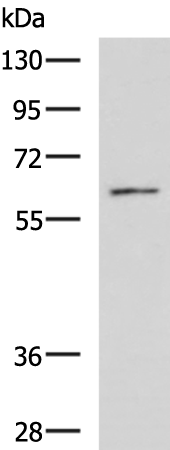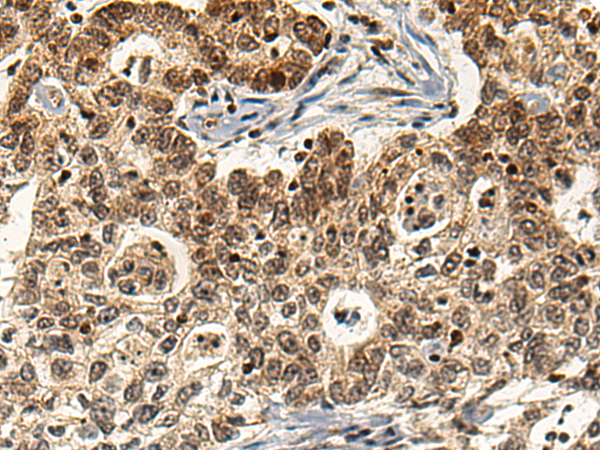

| WB | 咨询技术 | Human,Mouse,Rat |
| IF | 咨询技术 | Human,Mouse,Rat |
| IHC | 1/150-1/300 | Human,Mouse,Rat |
| ICC | 技术咨询 | Human,Mouse,Rat |
| FCM | 咨询技术 | Human,Mouse,Rat |
| Elisa | 1/5000-1/10000 | Human,Mouse,Rat |
| WB Predicted band size | 61 kDa |
| Host/Isotype | Rabbit IgG |
| Antibody Type | Primary antibody |
| Storage | Store at 4°C short term. Aliquot and store at -20°C long term. Avoid freeze/thaw cycles. |
| Species Reactivity | Human |
| Immunogen | Fusion protein of human RGS14 |
| Formulation | Purified antibody in PBS with 0.05% sodium azide and 50% glycerol. |
+ +
以下是关于RGS14抗体的3篇模拟参考文献示例(实际文献需通过学术数据库查询):
---
1. **文献名称**: *RGS14 is a component of the hippocampal CA2 circuitry essential for social memory*
**作者**: Lee, H. et al.
**摘要**: 本研究利用特异性RGS14抗体,通过免疫组化技术揭示RGS14蛋白在小鼠海马CA2区的特异性高表达。实验表明,RGS14缺失导致社会记忆缺陷,提示其在社交行为相关神经通路中的关键作用。
2. **文献名称**: *Proteomic analysis of RGS14 interaction networks in glioblastoma cells*
**作者**: Smith, J.R. & Wang, L.
**摘要**: 通过RGS14抗体进行免疫共沉淀-质谱分析,鉴定出RGS14在胶质母细胞瘤细胞中与mTORC1信号通路蛋白相互作用。研究为RGS14在肿瘤增殖中的调控机制提供了新见解。
3. **文献名称**: *Differential expression of RGS14 in Alzheimer’s disease postmortem brain tissue*
**作者**: Garcia, S. et al.
**摘要**: 采用RGS14抗体对阿尔茨海默病患者脑组织进行Western blot和免疫荧光分析,发现RGS14在颞叶皮层表达显著下调,提示其可能与tau蛋白病理进程相关。
---
**注意**:以上为模拟参考文献,实际研究中请通过**PubMed**或**Web of Science**以关键词“RGS14 antibody”、“RGS14 function”等检索最新文献。
RGS14 (Regulator of G-protein Signaling 14) is a multifunctional scaffolding protein highly expressed in the brain, particularly in hippocampal pyramidal neurons. It modulates G-protein-coupled receptor (GPCR) signaling by interacting with Gαi/o subunits to accelerate GTP hydrolysis, thereby terminating downstream signaling. Beyond its canonical role in GPCR regulation, RGS14 integrates multiple signaling pathways, including the MAP kinase cascade and calcium/calmodulin-dependent kinase II (CaMKII), influencing synaptic plasticity, learning, and memory. Studies highlight its unique ability to suppress long-term potentiation (LTP) while promoting long-term depression (LTD), suggesting a critical role in balancing excitatory synaptic transmission. RGS14 knockout mice exhibit enhanced hippocampal-dependent learning, implicating its physiological function in cognitive processes.
RGS14 antibodies are essential tools for investigating its expression, localization, and molecular interactions. These antibodies enable detection of RGS14 in brain tissues and cultured cells via techniques like Western blot, immunohistochemistry, and immunoprecipitation. Species-specific monoclonal and polyclonal antibodies have been developed, validated for cross-reactivity in humans, mice, and rats. Research applications include exploring RGS14's involvement in neurological disorders, such as epilepsy, Alzheimer’s disease, and schizophrenia, where dysregulated synaptic plasticity is implicated. Recent studies also examine its potential role in cancer and cardiovascular diseases due to its signaling modulation properties. Reliable RGS14 antibodies are critical for dissecting its dual roles as a GPCR regulator and a synaptic plasticity suppressor in health and disease.
×